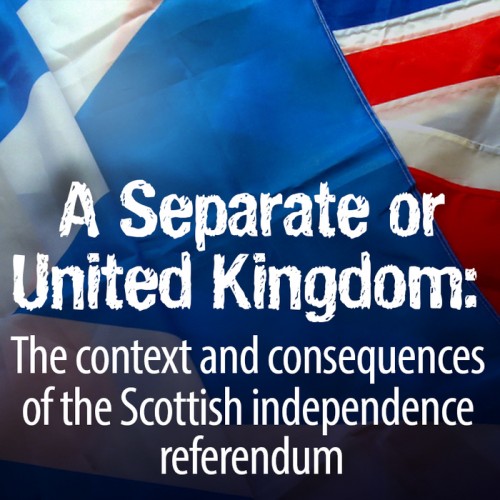 With separate histories and political-cultural traditions, the UK and Spain do not have the same nation-state DNA. Yet both face issues over regional independence. While the UK Government has legitimised the Scottish Government and supported the Scottish Independence referendum as a highly democratic exercise, Spain stands out as remaining normatively inflexible without, so far, even contemplating any dialogue with the presidents of the Catalan and Basque Autonomies.
With separate histories and political-cultural traditions, the UK and Spain do not have the same nation-state DNA. Yet both face issues over regional independence. While the UK Government has legitimised the Scottish Government and supported the Scottish Independence referendum as a highly democratic exercise, Spain stands out as remaining normatively inflexible without, so far, even contemplating any dialogue with the presidents of the Catalan and Basque Autonomies.
Other EU nation-states accept the UK’s approach to sort out regional and nationalistic claims democratically. But Spain has been avoiding the demands of the Catalan and Basque institutions and citizens on the basis of both historic and more recent episodes of political unrest. As a result, it seems impossible to open any discussion about the devolution claims of city-regional small nations, particularly in terms of devising an internal, alternative and re-scaled configuration of Spain as a nation-state, which would involve modifying the 1978 Constitution. In the case of the Basque Country, this is presented as the least likely outcome as political violence in the region has been both a major obstacle and also a source of inertia. Nevertheless, ETA (Euskadi Ta Askatasuna)[1], announced a ‘definitive cessation’ of its campaign in 2011 and, therefore, should welcome any kind of democratic implementation that involves devolving powers to the Basque Country.
But are there any remarkable differences between EU nation-states such as the UK and Spain?
Indeed, I think there are plenty of them.
The emerging of ‘city-regions’ beyond their nation-states
Within the broader global context, established nation-states are facing substantial changes, not only externally in terms of the global geostrategic game, but also internally in their relations with constituent ‘city-regions’. These ‘city-regions’ appear as dynamic, networked, territorial configurations embedded in their referential nation-states and driven by a wide range of diverse, transformative promotional policies that result in very uncertain consequences for both the ‘city-regions’ and the nation-states.
A number of scholars have argued that globalisation and European integration have led to a resurgence of post-nationalism, which goes beyond nation-states. And it is specifically in this context that ‘city-regions’ are making advances. Each of them are doing this in their own way: some are promoted by economic renewal policies, while others are driven by national identity demands. Thus, political devolution, economic development and nation-state re-scaling processes are merging and becoming intertwined, thereby establishing a new European regional order characterised by the presence of city-regional small nations as new key players. Thus far, the strategic scenarios are not clear and they remain uncertain considering, on the one hand, the heterogeneous tradition of the nation-states themselves and, on the other hand, the political histories of these city-regional small nations. Nevertheless, it is clear that this new order must be taken seriously through close attention to its democratic dimension and to the clear territorial and political consequences for the ‘city-regions’, their related nation-states and the EU as a whole.
The ‘postindependence’ debate
In an attempt to shed some light on this debate, at a meeting in the Basque Region last June, I presented a book, in its Basque version, entitled ‘Postindependence’ (www.postindependence.org), in which I compare eight ‘city-regions’ from the social innovation perspective by addressing their unique innovative territorial strategies that I am researching under the umbrella of the project, ‘Benchmarking City-Regions beyond Nation-States’ (www.cityregions.org), developed through the Future of Cities Programme here at Oxford.
The book sets out to capture the different natures of the social innovation processes of these eight ‘city-regions’. It suggests a benchmarking between the eight ‘city-region’ cases beyond their referential ‘nation-states’, which are the Basque Country (Spain and France), Dublin (Ireland), Portland (Oregon, USA), Oresund (Denmark and Sweden), Iceland, Liverpool/Manchester (UK), Scotland (UK) and Catalonia (Spain).
Among these cases, there are two groups of ‘city-regions’: those that are fuelled merely by economic renewal and those driven by national identity factors. In the first group, I include Dublin, Portland, Oresund and Liverpool/Manchester; in the second group are the Basque Country, Iceland, Scotland and Catalonia. The unit of analysis is the city-region, in which a complex networked dimension could account for different currently established socio-territorial structures, such as small nations (the Basque Country, Scotland and Catalonia), metropolitan cities (Dublin, Portland, Liverpool and Manchester), cross-border regions (Oresund) and small states (Iceland).
For the purposes of illustration, I will extract from the book some brief conclusions for each of the three city-regional small nation cases, the Basque Country, Catalonia and Scotland, in relation to their referential nation-states.
| City-regional small nation | Population in Millions(Nation-State %) | GDP contribution related to Nation-State (%) |
| Scotland | 5.3 (8) | 9 |
| Catalonia | 7.5 (16) | 19 |
| Basque Country[i] | 2.2 (5.5) | 6 |
Table 1: City-regional small nations’ populations and GDP. Source: The New York Times
In their respective movement, each country exhibits different democratic processes and levels of social innovation (for more on the concept of ‘social innovation’, see here).
- Scotland currently represents the first relevant case in which a hypothetical independence option has been agreed on by both the regional Scottish government and institutions (Holyrood) and the British nation-state government and institutions (Westminster). As a consequence, due to its substantial citizen engagement and the way in which the independence referendum has been managed democratically by both sides, this case demonstrates very good social innovation practices—efficient governance, social media usage and a rationalised dialectic. The outcome is not yet clear although there is an increasing trend pointing towards a YES option.
- Catalonia is a case that should be understood in the context of the significant level of social support that has been gained (70%) for independence, which has prompted planning for a potential consultation event on 9th November and also pushed the Catalan Regional Government to accept this possibility, even against the will of the Spanish Central Government. However, it remains unclear what the socio-economic proposals of each side will be. The main debate is focused on the real controversy regarding whether or not to honour the consultation without having any information about the content. It thus seems that the confrontational and antagonistic dialectic adopted does not, in the short term, help to achieve a democratic outcome. The way a grassroots movement has been forming and leading towards organizing a consultation, should be considered a good practice from the social innovation perspective.
- Finally, the Basque Country presents a new and positive context, which has evolved very quickly and has created an environment in which a demand for a referendum is bound to occur sooner or later as a consequence of the overcoming of the political violence that dominated the previous era. The main issue for any such referendum is the continued lack of preparation for the democratic content of the debate. Furthermore, the region may have the same difficulties as those faced by Catalonia regarding Spain’s inflexible position. However, internally, bottom-up support is being self-organized by the civil society (Gure Esku Dago platform) while political parties’ policy-making proposals and involvement will start coming up in the short-term strategic scenario.
Whatever it happens in Scotland, Catalonia and the Basque Country in the forthcoming weeks and months, the (post)independence debate has come to the EU context to stay. Thus, diverse city-regional contexts in relation to their nation-states should be meticulously looked into, in order to find unique ways to keep re-framing permanently local and global democracies.
This post is part of “A Separate or United Kingdom“, our blog series analysing the issues surrounding the Scottish referendum.
[1] Basque separatist group.
[2] Data relate to the Basque Country side in Spain. The French side is not represented in these figures.
[3] http://www.nytimes.com/2014/08/06/world/europe/catalan-vote-seen-as-test-for-separatists-in-europe.html








No Comment